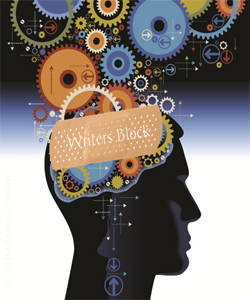We’ve all had moments where our creativity failed us. We had an idea, but couldn’t make it real—the words wouldn’t come, or when they did they felt stilted, awful. We felt incredibly alone and isolated in this because we are writers; the words are supposed to fall from our fingers like water down Niagara Falls.
I have learned to write my way through the block. Yes, the work I produce at that moment is awful, and no, I wouldn’t show it to the dog. But the act of writing every day keeps you fit and in the habit of writing. This job requires us to practice, as if it were dancing or ice-skating. And, just like any sport, doing well at it requires discipline. When we stop writing for any reason, we lose our momentum and our purpose.
We lose our passion.
When you have come to a place where you believe you can’t write, save the file, close it, and walk away from that manuscript. Delete nothing. You will come back to this later and will be able to use some or all of it, so file it properly.
Sometimes, the problem is that your mind has seen a shiny thing, a different project that wants to be written. If that is the case, my advice is this: work on the project that is on your mind. Let that creative energy flow, and you will eventually be able to become reconnected with the first project.
 But what about those times when you need to write, you have to write, but the words won’t come? I think of it like having a sports injury: Dr. Jasperson has diagnosed you with a sprained-brain. (Did she really write that? Insert groans here.)
But what about those times when you need to write, you have to write, but the words won’t come? I think of it like having a sports injury: Dr. Jasperson has diagnosed you with a sprained-brain. (Did she really write that? Insert groans here.)
Seriously, I have some physical therapy for your bruised writing-muscles.
First, we have the fear factor to overcome. You need to be able to prove to yourself that you can write. This is a small exercise, very short, and I got the idea for this while in a seminar on the craft of writing essays offered by the bestselling author of Blackbird, Jennifer Lauck. As I was sitting in her class and embarking on the writing drills for structuring your essay, I had one of those bolt-of-lightning moments, a tangent to nowhere, as it didn’t pertain to essays, but it seemed important so I wrote it down.
What had happened was, Jennifer gave us prompts and asked us to write to them. I have never been good at writing to someone else’s prompts. My ideas don’t flow that way. To make it worse, we were going to have to share them with someone else in the class.
I never share work that hasn’t been revised. it might not seem as perfect to you as I believe it is, but it has been revised and is the best I could offer. I felt panicky, terrified I wouldn’t be able to write, and would embarrass myself. My mind was blank.
But then, I saw what Jennifer’s prompt was, and it occurred to me that I could do that.
When I read the prompt and had that “I can do this” moment, I realized that most of the time, writer’s block is a result of not being able to visualize what you want to write about, and if you can’t visualize it, you can’t describe it. Once you have experienced that moment of complete inability, fear of not being able to write magnifies the problem until it paralyzes us.
So, I am offering you the same writing prompt Jennifer Lauck used as the first exercise in her class:
- Open a new document. At the top of this document type: Where I Am Today:
This is going to be a literal interpretation and description of your surroundings. Look around you, and see the place where you are. Briefly describe the environment you are sitting in, what you see, and then describe how you feel sitting in that place. Just give it two or three paragraphs.
For me, sitting here at this moment on a Sunday morning and writing this post, it runs like this:
I sit in the small, third bedroom of my home. It’s technically my office, but is, in reality, a cluttered storeroom, known here as the Room of Shame. A glass of water sits beside my elbow, as does my cell phone. My desk holds numerous books on the craft of writing and my computer.
Two clear plastic bins containing books and paraphernalia organized to take to book signings are stacked beside the door. I prop my feet on a large bookshelf stuffed with books, so full the shelves have bowed. Stacks of cardboard boxes filled with things that were, at one time, deemed important to keep, surround me. Filing cabinets full of legal papers, tax forms, and research also take up space, all stuffed with the debris of our business life.
The desk is not my friend. The sliding keyboard shelf is broken on the left side, hanging at a slight angle. I work with a broken desk, despite the large box which contains my new desk, which leans against the closet behind me. That dusty box has been there for six months or more, unopened.
I could easily clean this space, and set up my desk. It would take no time at all, perhaps a day at most. It’s a mountain I put off climbing.
See? At the end of this exercise, you have written a drabble, a small short story. But, more importantly, you have written the setting for a scene. Those paragraphs are around 216 words and are nothing special. Nor were the words I wrote in the seminar, but I felt good about writing them because I had been given a task that had at first left me feeling helpless and unable to do it: writing to a prompt. However, in that class, because it was a simple, non-threatening thing, I was able to accomplish it, and I felt empowered.
So, now we are going to gently rebuild our damaged writing muscles.
- For your next exercise, go somewhere else and take your notebook. Write three more paragraphs detailing what you are looking at, and how you fit into it, and how it makes you feel.
You could do this at the mall, sitting in a coffee shop, or the parking lot at the supermarket. Or you can do what I am doing: sit on your porch and write a few paragraphs about the space you are in, what you see, and what you sense.
My back porch is quiet, and the day is gray. Rain is falling softly. Just beyond the auto repair shop’s parking lot, and the coffee stand, glimpsed between the conical cypress trees, the sounds of the highway are muted. One of the neighbors has let their dog out without a leash, and the free-range cats are disturbed by it. The scent of sodden vegetation is fresh and speaks of autumn.
The third exercise is more abstract:
- Where do you want to be? Visualize it, and describe it the same way as you described the places you could see. For me, that runs like this:
I want to be on a foggy beach, walking along the high-tide mark. I want to hear the gulls and sh-shing of the waves. I want to feel at peace again.
 If you do these three exercises at the same time every day, describing the environments and your perceptions in a different space each time, even when you have nothing to say that is worth reading, you are writing. With perseverance, you will be writing your other work again. The important thing is to write even if it is only a few paragraphs. This is the physical therapy I recommend for overcoming writer’s block.
If you do these three exercises at the same time every day, describing the environments and your perceptions in a different space each time, even when you have nothing to say that is worth reading, you are writing. With perseverance, you will be writing your other work again. The important thing is to write even if it is only a few paragraphs. This is the physical therapy I recommend for overcoming writer’s block.
Just like an athlete recovering from an injury, you must gradually rebuild your confidence, strengthen your writing muscles, and regain your writing work ethic. You need to empower your creativity for it to flow.
As I said, this how my mind works. If you are suffering a dry spell, give these exercises try, as you have nothing to lose. I hope that when these exercises are no longer painful, you will be able to write again.








Great advice!
I’m a big proponent of listening to evocative music to put the writer in the proper mood for a scene, or if starting from scratch then in the mood for the genre. I’m also a proponent of William Stafford’s mantra: “To get over writer’s block, lower your standards.” (paraphrased) You can always punch it up in revision.
LikeLiked by 1 person
PS- Since 2011, I’ve only gotten writer’s block when I sent a book off to be published and suddenly didn’t know if I would ever write again.
LikeLiked by 1 person
@Stephen – That happens to me too! But as you say, I lower my standards and write drivel until my imagination kicks in.
LikeLike